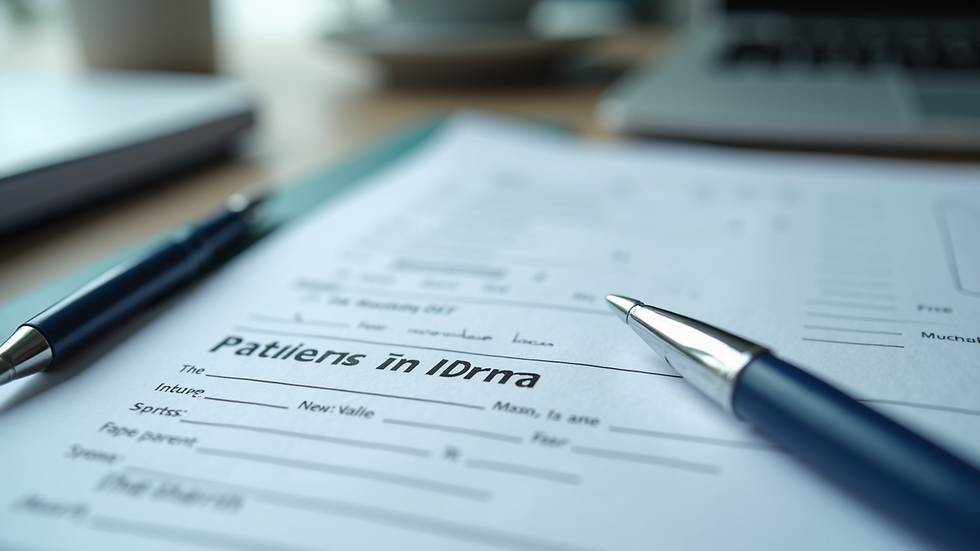What to Expect During Your First Visit to a Psychiatrist
- Sindhura Saini
- Jul 22, 2025
- 3 min read
Visiting a psychiatrist for the first time can be an overwhelming experience. You may have many questions and concerns about what to expect. Whether you are seeking help for depression, anxiety, or another mental health issue, understanding the process can ease some of your fears. In this post, we'll guide you through what to expect during your first visit to a psychiatrist.
Your First Visit
The initial visit to a psychiatrist typically involves a comprehensive evaluation. This evaluation serves multiple purposes: it helps the psychiatrist understand your mental health history, current symptoms, and how these issues affect your daily life.
During your appointment, be prepared to discuss:
Your medical history: This involves any physical health issues and medications you currently take.
Your mental health history: Be honest about previous treatments and diagnoses.
Your current symptoms: Describe how you're feeling, including specific examples and how long you've been experiencing symptoms.
Your psychiatrist may also ask about your family history regarding mental health issues. This helps them understand whether there are genetic factors at play in your situation.

The Importance of New Patient Forms
Before your first visit, you may receive new patient forms to fill out. These forms typically ask for personal information, medical history, and consent for treatment. Completing these forms ahead of time can help streamline your appointment.
If you’re looking for the link to these forms, you can find them here. Filling out these forms accurately and thoroughly is crucial. This information provides your psychiatrist with a clearer picture of your needs and aids in effective diagnosis and treatment planning.

What Happens During the Evaluation
During your first appointment, the psychiatrist will conduct a detailed evaluation. Here’s what you can expect:
Interview: The psychiatrist will ask you several questions. This may feel like a conversation rather than an interrogation. Answering these questions honestly will help them understand you better.
Assessment Tools: They might use standardized assessment tools. These assessments help measure various aspects of your mental health and functioning.
Discussion of Treatment Options: In some cases, if you're comfromlfortable and your psychiatrist feels it's appropriate, they may start discussing treatment options. This could include therapy, medication, or referrals to other specialists.
Setting Goals: Towards the end of your session, your psychiatrist may help set short-term and long-term goals for your treatment. This collaborative approach is essential to effective mental health care.

After the Evaluation: Follow-up Steps
After your first visit, take note of what happens next. Here are some common follow-up steps:
Follow-up Appointments: Depending on your needs, your psychiatrist may schedule follow-up appointments to monitor your progress.
Additional Assessments: They may recommend additional tests or assessments to further understand your condition.
Therapeutic Relationship: Establishing a good rapport with your psychiatrist is key to an effective treatment journey. Don’t hesitate to share your thoughts and preferences during therapy.
Remember that mental health treatments may take time. It’s normal to feel uncertain initially, but establishing a good relationship with your psychiatrist can significantly influence your progress.
Overcoming Anxiety Before Your Visit
Feeling anxious about your visit is perfectly normal. Here are some tips to help you manage pre-appointment nerves:
Prepare Ahead of Time: Write down your symptoms, questions, and concerns. This preparation can help you communicate better during your evaluation.
Practice Relaxation Techniques: Deep breathing exercises, meditation, and other relaxation techniques can help reduce anxiety before your appointment.
Bring a Support Person: If you're comfortable, consider bringing a friend or family member for support. They can offer reassurance and help you remember what was discussed during your visit.
Each person's mental health journey is unique, and it's essential to find a psychiatrist you feel comfortable with. Your mental well-being is worth the effort, and taking this step is a sign of strength.
Embracing the Journey Towards Mental Wellness
Beginning therapy can be a life-changing experience. Embrace the journey ahead, knowing you are taking proactive steps towards better mental health. Remember that progress may not be linear; it may take time to find the right treatment and develop coping strategies that work for you.
Your first visit to a psychiatrist is just the beginning. Use this opportunity to voice your concerns, set your goals, and explore the resources available to help you navigate your mental health challenges. Stay open-minded and allow yourself the grace to explore and grow.
In summary, knowing what to expect during your first visit can help ease anxiety and set the stage for a productive therapeutic relationship. Remember that you don't have to navigate this journey alone; professionals are here to support you every step of the way.



Comments